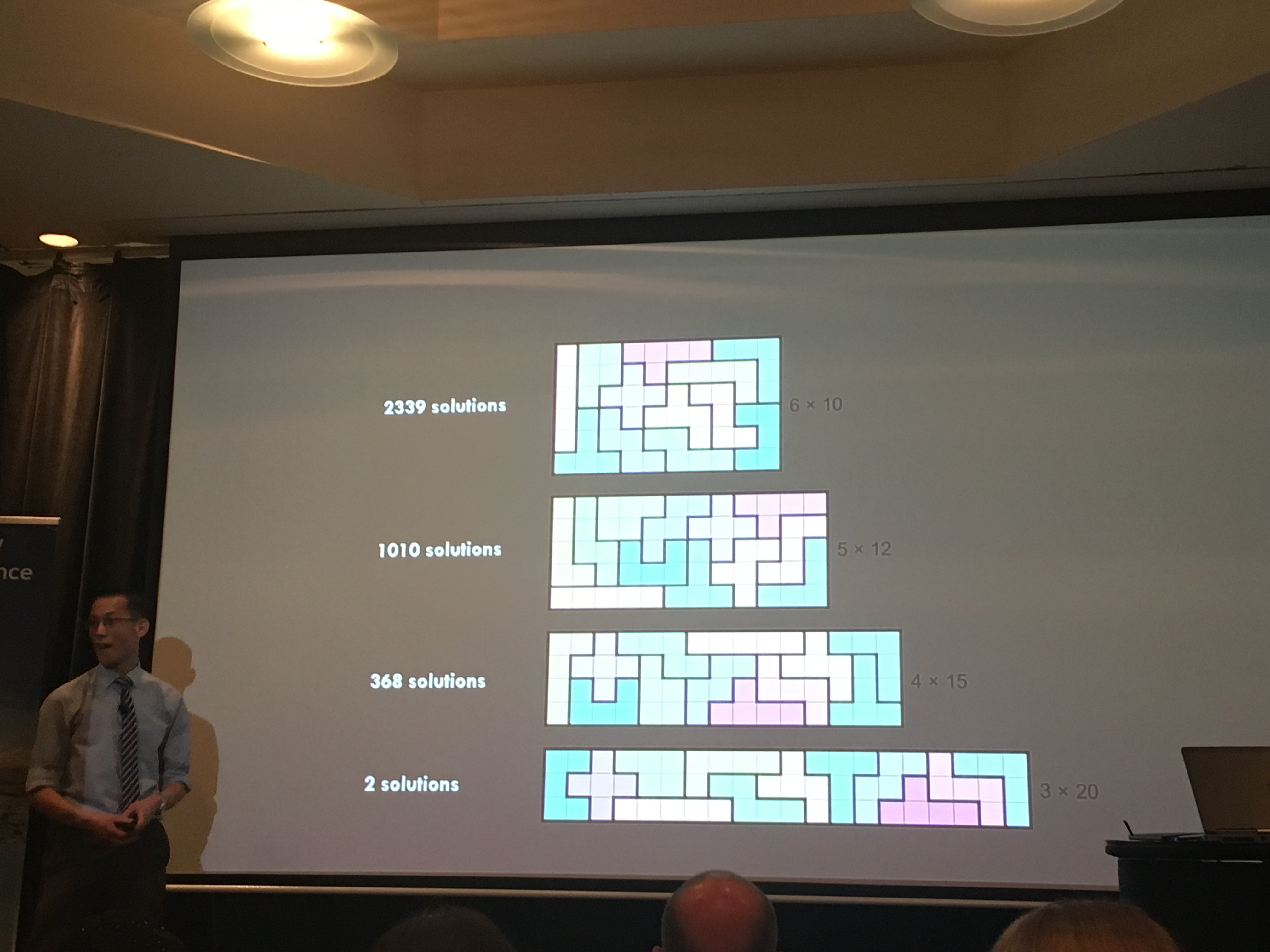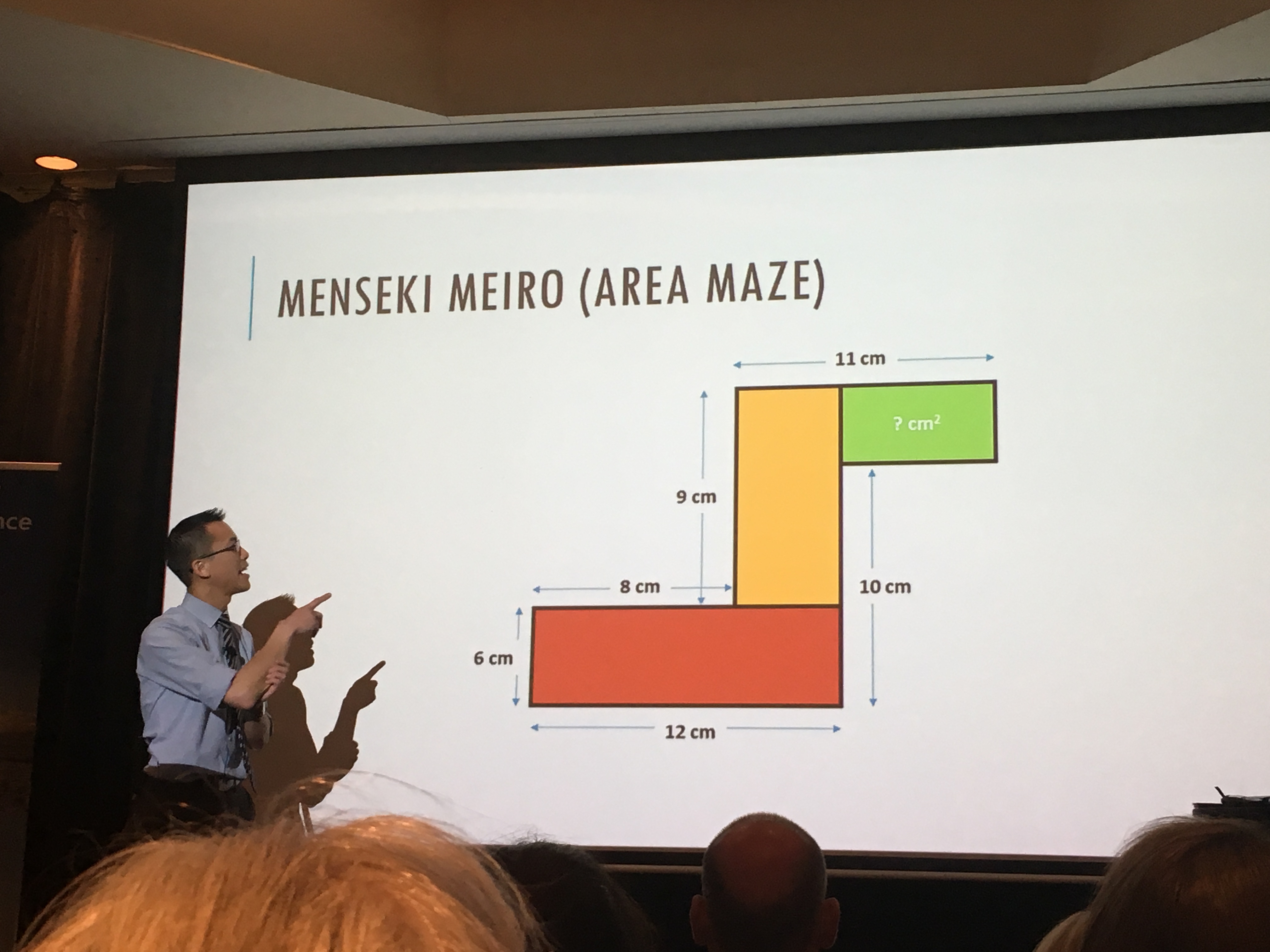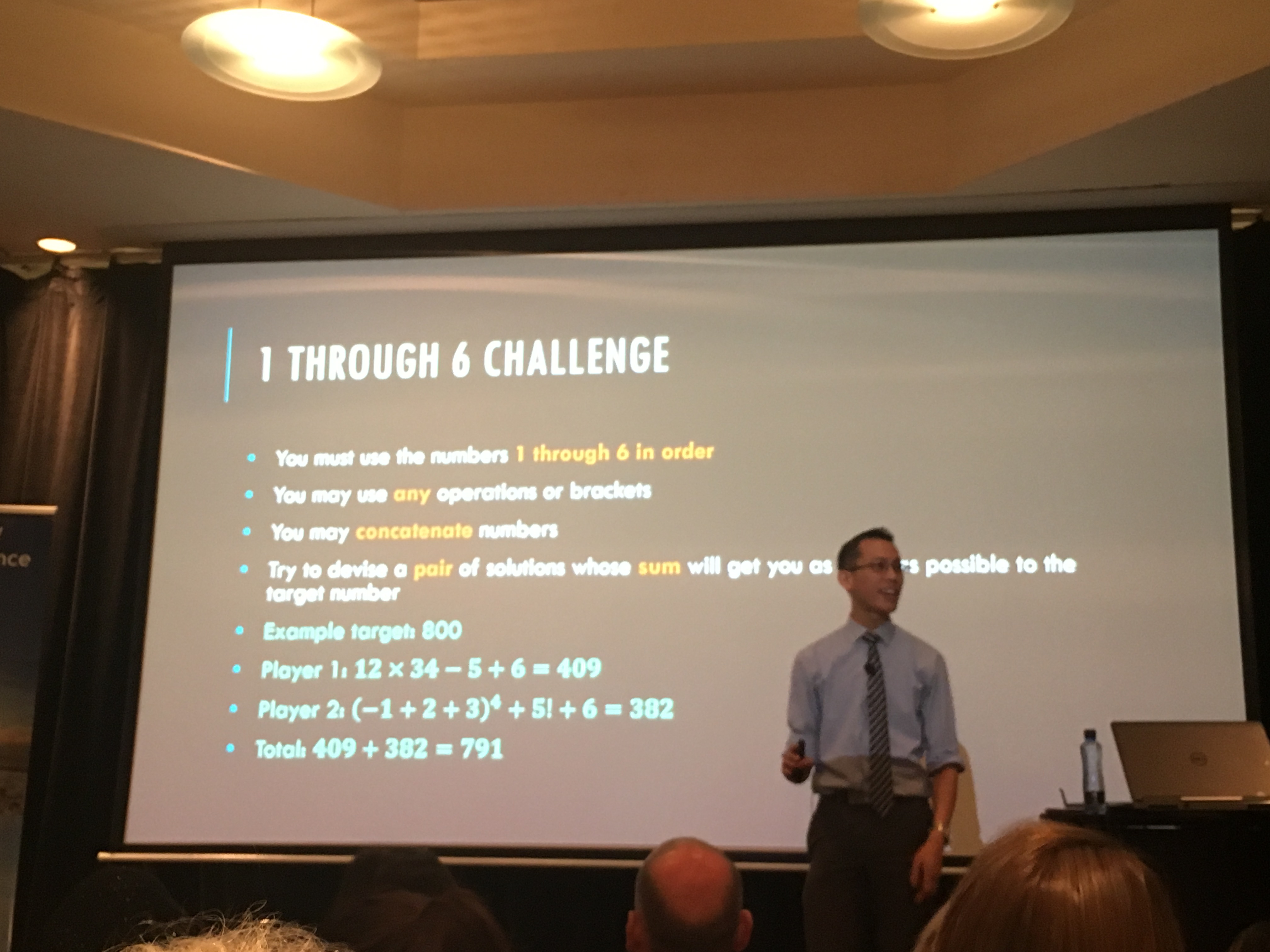“There are no wrong answers, only right answers to other questions.” Eddie Woo
I think there was a collective virtual-hug from the audience saying ‘welcome home’ when Eddie Woo (@misterwootube) took to the stage on day two of the MANSW conference. There was a sense of pride to see ‘one of our own’ NSW mathematics teachers gaining fame for all the right reasons, bringing the joy of mathematics and teaching to the masses. Eddie acknowledged the crowd and the amazing work that is done day in and day out in our schools by primary and secondary teachers. There is an incredible array of mathematics teachers (many of whom presented at the conference) that are bringing mathematics to life for our students, I hope that they also get noticed the way Eddie has been.
The ever-humble Eddie wooed us (see what I did there) with his world of mathematical wonders through words of mathematical wisdom. He reminded us of the reason why we teach mathematics.
“We teach mathematics in the service of identity, not just for the sake of learning.” Eddie Woo
Digging deeper into this concept of identity, Eddie mentioned the work of the Swiss education researcher Etienne Wenger whose work recognises identity as an important aspect of communities of practice as a social theory of learning. In essence, this theory aims to place meaning at the centre of learning, not simply an acquisition of information. Wenger states that,
… the theory does not separate learning from the becoming of the learner. That’s why identity is such a central concept. If a really important part of learning is the shaping of an identity, then one key implication for education is that you cannot give people knowledge without inviting them into an identity for which this knowledge represents a meaningful way of being.
(Farnsworth, Kleathous & Wenger-Trayner, 2016, page 145)
@joboaler shares the opening framework, Learning as a change in identity. Learning transforms who we are. #lovemaths #youcubed #makingmathscount pic.twitter.com/dHDjKwyxLI
— Cathy Williams (@chaoskeeper11) 18 September 2018
Eddie isn’t the only one quoting Wenger or discussing identity in recent times, Cathy Williams of youcubed who works alongside Jo Boaler tweeted this post last week. The concept of identity also has strong links to Carol Dweck’s work on growth mindsets. For further readings regarding identity see the reference list below.
Eddie provided a metaphor of the apprentice chef who may learn to master many cuisines, but as a chef it is your knowledge of the underlying set of skills that you use no-matter-what that makes you great. As in mathematics, learning topics in isolation does not make you a mathematician, working mathematically does.
Eddie talked about purpose and confidence. He highlighted the importance of dispositions within the Australian Curriculum’s definition of numeracy. Students’ dispositions within mathematics is also discussed as one of five proficiencies of mathematics in the seminal paper Adding it up by Kilpatrick, Swafford and Findell. Eddie provided us with three aspects to focus on to assist in building students’ dispositions towards mathematics:
- Collaboration- the motivation and goal of communication
- Openness- the perspective that enables flexible problem solving
- Creativity- the spark plug in our engine of reasoning
Homework from @misterwootube #MANSW18 @MathsNSW #creativity #dispositions pic.twitter.com/1jJs3pqcN7
— Dr Maree A Skillen (@MareeASkillen) 15 September 2018
We then were given plenty of play-time with Eddie, exploring Pentomino puzzles, Menseki Meiro’s Area Mazes (whose puzzles Eddie found through Alex Bellos who poses one of these area mazes in this guardian post) and Eddie’s own 1 through 6 challenge – an absolute winner of a game and so addictive that I’m sure many conference-goers have already played with their students or own children! All the while Eddie encouraged us to see things differently, to do things differently, to move away from the possible standard “here’s an example of how to do it, now go and do it” model, to a classroom climate where students instead are reasoning and communicating and are allowed to “sit and soak in simple mathematics.”
Eddie and Dan Meyer then led a panel chat answering some big questions, my take-away from the panel were how awesome Eddie and Dan are at making hashtagable (is that a word?) t-shirtable (is that a word?!) quotes. Eddie talked about ensuring that students have opportunities to create mathematics and apply it to other problems or new situations. He pointed out that the syllabus includes the words ‘including but not limited to…’ when talking about varying the types of problems to provide to students, otherwise “they are not being mathematicians, they are being machines.”
Dylan Wiliam was also quoted in that “everything works somewhere, and nothing works everywhere.” There is no one way to teach mathematics. Eddie also gave good advice re the ‘to-textbook-or-not-to-textbook’ question stating that;
the textbook is NOT the teacher- they are wonderful servants but terrible masters.
Both Dan and Eddie emphasised the need to develop relationships with your students. Stressing that it’s not pedagogy vs content, it’s loving the students and loving the mathematics, we need to “learn how they were thinking about it.” Dan also provided some good advice about those students who may ask “When will I need this?” or “When will this help me?” stating that this is often students complaining about their present state, not actually worrying about their future, and answering this question- if you can, still may not change their attitude to mathematics. Find ways to hook them into mathematics and develop within them a positive attitude and disposition towards mathematics.
I was planning to write about the wonderful sessions beyond morning tea on Day Two of the conference but alas, it will have to wait until the third instalment! In the next blog I’ll reflect on Dan’s session where ‘real world’ contexts in maths get a reality check, and a number of other great workshops I attended around formative assessment, crunchy problems and whiteboarding.
Resources
For more activities using pentominoes, see The Pentomino Game, Penta Place, Penta Play, Pentomino Puzzles, Pentominoes, Open and Shut
Eddie’s book “Woo’s wonderful world of mathematics” can be purchased from Pan MacMillan
References
Allen, K., & Schnell, K. (2016). Developing mathematics identity. Mathematics Teaching in the Middle School, 21(7), 398-405. doi:10.5951/mathteacmiddscho.21.7.0398
Anderson, R. (2007). Being a Mathematics Learner: Four Faces of Identity. Mathematics Educator, 17(1), 7-14.
Darragh, L. (2016). Identity research in mathematics education. Educational Studies in Mathematics, 93(1), 19-33. doi:10.1007/s10649-016-9696-5
Farnsworth, V., Kleanthous, I., & Wenger-Trayner, E. (2016). Communities of practice as a social theory of learning: A conversation with Etienne Wenger. British Journal of Educational Studies, 64(2), 139-160. doi:10.1080/00071005.2015.1133799
Kilpatrick, J., Swafford, J., & Findell, B. E. (2001). Adding it up: helping children learn mathematics. Washington, DC: National Academy Press.
Wenger, E. (1998). Communities of practice: Learning, meaning, and identity. Cambridge, U.K; New York, N.Y;: Cambridge University Press.








